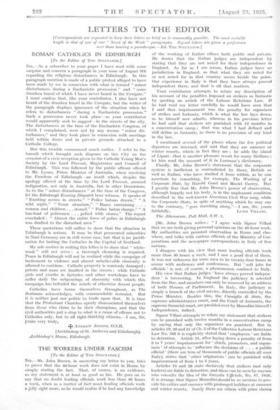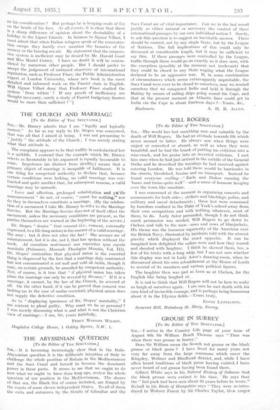THE WORKERS UNDER FASCISM
[To the Editor of TIM SPECTATOR.]
Sin,—Mr. John Brown, in answering my letter to you, tries to prove that the 40-hour week does not exist in Rome by simply stating the fact. That, of course, is no evidence, as my statement is at least as good as his. He goes on to say that no doubt leading officials work less than 40 hours a week, when as a matter of fact-most leading officials work a jolly sight more, as he would realize if he had any knowledge
of the working of Italian offices both public and private. He denies that the Italian judges are independent by stating that they are not noted for their independence in England. As far as I am aware, Italian judges have no jurisdiction in England, so that what they are noted for or not noted for in that country seems beside the point. Our experience in Italy is that they have always proved independent there, and that is all that matters.
• Your contributor attempts to • refute my description of his account of the penalties imposed on strikers as fantastic by quoting an article of the Labour Relations Law. If he had read my letter carefully he would have seen that I said that imprisonment was the penalty for organisers of strikes and lockouts, which is what the law lays down, as he himself now admits, whereas in his previous letter he had said that strikers are punished with 12 months in a concentration camp ; that was what I had defined and still' define as fantastic, as there is no provision of any kind in the law.
I mentioned several of the places where the few political deportees are interned, and said that they are summer or winter resorts, which in fact they are ; lie adds the island of Lipari—that is another pleasure resort for many Sicilians ; let him read the account of it in Larousse's dictionary.
Finally, Mr. John Brown's statement that the corporate system is inefficient is contradicted by those, British as well as Italian, who have studied it from within, as he can ascertain by consulting, for example, The Working of a Corporate State, by Harold Goad and Muriel Currey. But I greatly fear that Mr. John Brown's power of observation, although happily not his body, is in the unpleasant condition
described in the well-known body,-is
Civil War song, while the Corporate State, in spite of anything which he may say to the contrary, " goes marching along."—I am, Sir, yours faithfully, LUIGI VILLARI. The Athenaeum, Pall Mall, S.W. 1.
[Mr. John Brown writes : " I agree with Signor Villari that we are both giving personal opinions on the 40-hour week,. My • authorities are personal observation in Rome and else- where, and talks with various officials of the Ministry of Cor- porations and the newspaper correspondents in Italy of five nations.
I disagree with his view that most leading officials work more than 40 hours a week, and I saw a good deal of them. It was not unknown for some men to be twenty-four hours in arrear with audiences and conferences. But soft jobs for officials ' is not, of course, a phenomenon confined to Italy.
His view that Italian judges have always proved indepen- dent' is interesting. In England the judiciary is selected from the Bar, and members can only be removed by an address of both Houses of Parliament. In Italy, the judiciary is simply a branch of the civil service, directly controlled by the, Prime Minister. Besides this, the Consiglio di Stato, the supreme administrative court, and the Court of Accounts, the supreme financial court, are presided over by Mussolini himself Independence, indeed.
Signor Villari attempts to refute my statement that strikers can be punished with twelve months in a concentration camp by saying that only the organisers are punished. But in articles 19, 20 and 21 of Ch. 3 of the Collective Labour Relations Law No. 568 it is explicitly stated that ' employees ' are liable to detention. Article 21, after laying down a penalty of from 3 to 7 years' imprisonment for chiefs, promoters, and organ- isers ' of attempts to ' influence the decisions of . . . a public official' (there are tens of thousands of public officials all over Italy), states that ' other originators ' can be punished with imprisonment of from 1 to 3 years.
Articles '19 and 20 state decisively that strikers (not only leaders) arc liable to detention, and these can be seen by anyone who consults the files of the Gatzetta Ufficiale, No. 87, 1926. It is strange that Signor Mussolini should be so anxious to pro- vide his critics and enemies with prolonged holidays at summer and winter resorts. Surely there arc others with prior claims on his consideration ? But perhaps he is heaping coals of fire on the heads of his foes. At an events,. it is clear that there is a sharp difference of opinion about the desirability of a holiday in the Lipari Islands. In fairness to Signor Villari, must admit that when Italian refugees speak of theconcentra- tion camps they hardly ever mention the beauties of the scenery or the bracing sea air. My statement that the corpora- tive system is inefficient may be denied by Mr. Harold Goad and Miss Muriel Currey. I have no doubt it will be contra- dicted by numerous other people. But I should prefer to accept the judgement of unbiased observers of international reputation, such as Professor Finer, the Public Administration expert at London University, whose new book is the most detailed and informed work on the Fascist state in English. Will Signor Villari deny that Professor Finer studied the !Mein from within ' ? If any proofs of inefficiency are thought necessary, surely a study of Fascist budgetary finance Would be more than sufficient ? "1



































 Previous page
Previous page